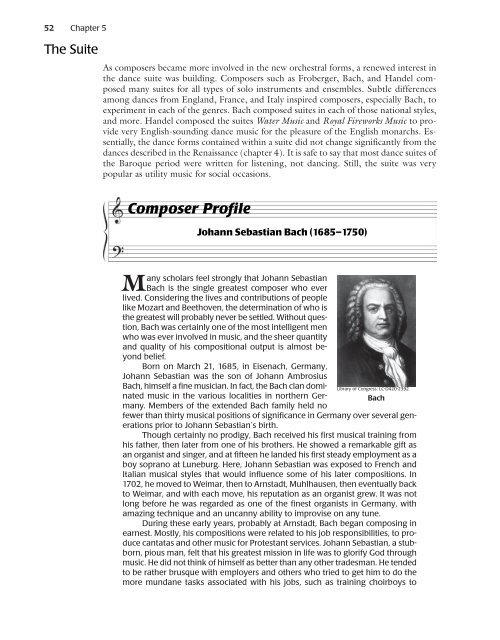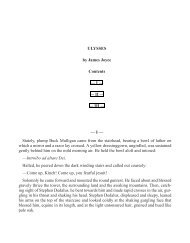Composer Profile - Activefolio
Composer Profile - Activefolio
Composer Profile - Activefolio
Create successful ePaper yourself
Turn your PDF publications into a flip-book with our unique Google optimized e-Paper software.
52 Chapter 5<br />
The Suite<br />
As composers became more involved in the new orchestral forms, a renewed interest in<br />
the dance suite was building. <strong>Composer</strong>s such as Froberger, Bach, and Handel composed<br />
many suites for all types of solo instruments and ensembles. Subtle differences<br />
among dances from England, France, and Italy inspired composers, especially Bach, to<br />
experiment in each of the genres. Bach composed suites in each of those national styles,<br />
and more. Handel composed the suites Water Music and Royal Fireworks Music to provide<br />
very English-sounding dance music for the pleasure of the English monarchs. Essentially,<br />
the dance forms contained within a suite did not change significantly from the<br />
dances described in the Renaissance (chapter 4). It is safe to say that most dance suites of<br />
the Baroque period were written for listening, not dancing. Still, the suite was very<br />
popular as utility music for social occasions.<br />
<strong>Composer</strong> <strong>Profile</strong><br />
Johann Sebastian Bach (1685–1750)<br />
Many scholars feel strongly that Johann Sebastian<br />
Bach is the single greatest composer who ever<br />
lived. Considering the lives and contributions of people<br />
like Mozart and Beethoven, the determination of who is<br />
the greatest will probably never be settled. Without question,<br />
Bach was certainly one of the most intelligent men<br />
who was ever involved in music, and the sheer quantity<br />
and quality of his compositional output is almost beyond<br />
belief.<br />
Born on March 21, 1685, in Eisenach, Germany,<br />
Johann Sebastian was the son of Johann Ambrosius<br />
Bach, himself a fine musician. In fact, the Bach clan domi- Library of Congress: LC-D420-2392<br />
nated music in the various localities in northern Ger-<br />
Bach<br />
many. Members of the extended Bach family held no<br />
fewer than thirty musical positions of significance in Germany over several generations<br />
prior to Johann Sebastian’s birth.<br />
Though certainly no prodigy, Bach received his first musical training from<br />
his father, then later from one of his brothers. He showed a remarkable gift as<br />
an organist and singer, and at fifteen he landed his first steady employment as a<br />
boy soprano at Luneburg. Here, Johann Sebastian was exposed to French and<br />
Italian musical styles that would influence some of his later compositions. In<br />
1702, he moved to Weimar, then to Arnstadt, Muhlhausen, then eventually back<br />
to Weimar, and with each move, his reputation as an organist grew. It was not<br />
long before he was regarded as one of the finest organists in Germany, with<br />
amazing technique and an uncanny ability to improvise on any tune.<br />
During these early years, probably at Arnstadt, Bach began composing in<br />
earnest. Mostly, his compositions were related to his job responsibilities, to produce<br />
cantatas and other music for Protestant services. Johann Sebastian, a stubborn,<br />
pious man, felt that his greatest mission in life was to glorify God through<br />
music. He did not think of himself as better than any other tradesman. He tended<br />
to be rather brusque with employers and others who tried to get him to do the<br />
more mundane tasks associated with his jobs, such as training choirboys to



